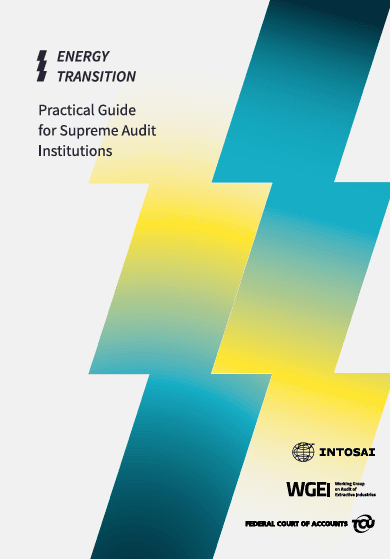The Brazilian Federal Court of Accounts Presents ClimateScanner Results at COP30
TCU joins discussions on sustainable finance, just transition, and climate adaptation during the conference in Belém
By Secom / Serint
On Monday (November 10), the Brazilian Federal Court of Accounts (TCU) will take part in the 30th United Nations Climate Change Conference (COP30), held in Belém, Pará. The highlight of TCU's participation is the session ClimateScanner and Painel ClimaBrasil: An Unprecedented Assessment by Audit Institutions of Government Climate Actions, which will take place on Tuesday (November 11), at 10 a.m., in the Sumaúma Room of the Brazil Pavilion (Blue Zone).
The event marks the global launch of the ClimateScanner results, a global platform coordinated by the TCU that evaluated governance, financing, and public policy actions in more than 100 countries. The session will also present the results of Painel ClimaBrasil, the national component of this initiative, which applied the ClimateScanner methodology to state and municipal levels. The Painel ClimaBrasil provides an unprecedented overview of the maturity of climate governance in Brazil.
Participants include COP30 President Ambassador André Corrêa do Lago, TCU President Minister Vital do Rêgo, BNDES President Aloizio Mercadante, UNDP Global Director for Climate Change Cassie Flynn, and IDB President Ilan Goldfajn.
For the next few days, TCU will emphasize the role of Supreme Audit Institutions (SAIs) in addressing the climate crisis. The Court will be representing the International Organization of Supreme Audit Institutions (INTOSAI), a position Brazil held for the past three years before transferring leadership to Egypt at the end of October.
TCU will also present key initiatives such as the Practical Guide to Energy Transition, designed to support the assessment and monitoring of changes related to the global energy shift. The publication compiles methodologies for climate-related audits, based on Brazilian experiences, with step-by-step guidance applicable to other audit institutions. Through a collaborative approach, the guide seeks to improve the management of energy policies and ensure that the transition to cleaner energy sources aligns with global climate goals.
Another highlight is the Multidimensional Poverty Index, an initiative that provides methodology to help audit institutions assess the effectiveness of public policies aimed at reducing poverty. The project adopts a multidimensional perspective, considering factors beyond income to measure and evaluate poverty, and is being developed in partnership with the University of Oxford.
TCU's presence at COP30 reaffirms the Court's commitment to sustainability and the strengthening of climate governance, said TCU President Minister Vital do Rêgo. Our role is to ensure that public resources allocated to address climate change are used efficiently, transparently, and responsibly. By sharing experiences and tools such as the ClimateScanner, TCU helps countries move forward together in building more effective environmental policies that benefit future generations.
TCU is also represented at the conference by Ministers Augusto Nardes and Bruno Dantas.
Additional agenda
Monday (November 10), 3 p.m. INTOSAI Pavilion (Blue Zone). Panel: Promoting the Global Financing Agenda through Transparency and Accountability. The discussion will bring together representatives from the TCU, the Latin American Group on Sustainable Finance (GFLAC), the NDC Partnership, and the Brazilian Development Bank (BNDES) to discuss ways to strengthen transparency and integrity in climate governance and sustainable finance.
Monday (November 10), 6 p.m. Brazil Pavilion (Blue Zone), official opening of the Brazil Pavilion. The ceremony will feature Brazilian and international leaders and present the country's main initiatives and events during the conference.
Tuesday (November 11), 5 p.m. Ibero-América Viva Pavilion (Green Zone). Panel: Innovation Ecosystems for Climate Action: data, AI, and intelligent systems. The discussion will explore how artificial intelligence, intelligent systems, and data analytics can strengthen climate governance, decision-making, and sustainable public policy design.
Wednesday (November 12), 12 p.m. Finland Pavilion (Blue Zone). Session: Auditing for climate resilience: protecting public budget from disaster risks. Organized in partnership with the UN Office for Disaster Risk Reduction (UNDRR) and INTOSAI's Working Group on Environmental Auditing (WGEA), this panel will present audit results on climate adaptation conducted by audit institutions in various countries.
Wednesday (November 12), 4:15 p.m. Regional Climate Foundations Pavilion (Blue Zone). Panel: Territories in Transition: the just transition as a path to sustainable development in coal-dependent regions. The discussion will focus on the Just Energy Transition Plan of Rio Grande do Sul (TEJ-RS) and will include Minister Augusto Nardes (TCU), Marjorie Kauffmann, Secretary for Environment and Infrastructure of Rio Grande do Sul, Rosana Santos, Executive Director of Instituto E+ Transição Energética, William Wills, Project Director at Centro Brasil no Clima, and representatives from the Ministry of Mines and Energy (MME).
Thursday (November 13), 3 p.m. UN/UNDP Pavilion (Blue Zone). Session: Effectiveness for Adaptation: why climate adaptation plans fail and how auditors can help fix them. The event will present findings from more than 50 international audits on climate adaptation, discussing challenges in implementation, monitoring, and policy effectiveness.
Thursday (November 13), 5:30 p.m. Cumaru Room, Brazil Pavilion (Blue Zone).
Panel: Inefficient Fossil Fuel Subsidies: barriers, challenges, and domestic and global perspectives. Experts from the International Institute for Sustainable Development (IISD), Transforma Global, Columbia Climate School, Inesc, WWF-Brasil, and the TCU will debate how reforming fossil fuel subsidies can accelerate the energy transition and strengthen social justice.
Throughout COP30, the TCU will also hold bilateral meetings with international audit institutions and participate in the launch of the Editorial Board collection of the Brazilian Senate, at the INTOSAI Pavilion, expanding dialogue on transparency and climate governance.
Follow the link to access the INTOSAI pavilion agenda at COP30
